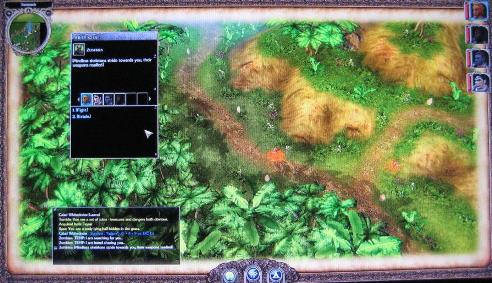NWN2: Storm of Zehir – Looking forward by looking back
 For most older PC gamers, the thought of the heady days of game releases like Baldur’s Gate 2 bring a flush to their cheeks and a twinkle to their eyes. For many, the games of today – role-playing games in particular – have lost a great deal as they have shifted focus from quality of writing and combat systems to quality of graphics. While bemoaned initially due to what many consider a lackluster main campaign, the Neverwinter Nights games have become central to an older style of gaming because of their pseudo turn-based combat and ease of creating custom content. Many of the classics of the RPG genre have been redone using either the original NWN or the sequel. Some of these – such as the ‘Premium Module’ Wyvern Crown of Cormyr and the excellent Darkness Over Daggerford added innovative features not found in the original game (Cormyr added mounted combat via a jousting game, and Daggerford allowed you a stronghold). The first expansion for Neverwinter Nights 2, Mask of the Betrayer, focused on providing some of the best writing in a game since Planescape: Torment. The recently released second expansion focuses on delivering a classic feeling party-based RPG experience. While I am still fairly early on in the twenty-plus hour campaign, I wanted to provide my first impressions of how they did.
For most older PC gamers, the thought of the heady days of game releases like Baldur’s Gate 2 bring a flush to their cheeks and a twinkle to their eyes. For many, the games of today – role-playing games in particular – have lost a great deal as they have shifted focus from quality of writing and combat systems to quality of graphics. While bemoaned initially due to what many consider a lackluster main campaign, the Neverwinter Nights games have become central to an older style of gaming because of their pseudo turn-based combat and ease of creating custom content. Many of the classics of the RPG genre have been redone using either the original NWN or the sequel. Some of these – such as the ‘Premium Module’ Wyvern Crown of Cormyr and the excellent Darkness Over Daggerford added innovative features not found in the original game (Cormyr added mounted combat via a jousting game, and Daggerford allowed you a stronghold). The first expansion for Neverwinter Nights 2, Mask of the Betrayer, focused on providing some of the best writing in a game since Planescape: Torment. The recently released second expansion focuses on delivering a classic feeling party-based RPG experience. While I am still fairly early on in the twenty-plus hour campaign, I wanted to provide my first impressions of how they did.
There are two major differences that mark this game – first, soon after creating your hero as usual you create a full party of adventurers to accompany you on your travels. The other difference is the addition of an overland map that hearkens back to games such as Baldur’s Gate II. While these two things by themselves aren’t overly significant, it is their implementation in the game that represents a major change forgenre that is at once modern and ‘ancient’.
I have read some reviews (which is against my general policy but I have gotten a bunch of messages regarding some of them), and I can only assume that many of the folks would respond to criticism that they are clueless about RPG’s with something like “hey, I’m a big fan of RPG’s for years, including old-school games like KotOR and Morrowind’. Nothing against either of those fine games, but they represent a thoroughly modern mind-set in gaming that is dramatically detached from the classics of the genre.
Here is a thought: if you spend more time during character creation twiddling with facial features than with stats and skills, you will be absolutely clueless approaching this game. Additionally, if you take a single band of characters through without creating another one, you are missing out on a key part of the experience. Personally, I put together my fairly standard ‘neutral good’ party led by my idealistic Paladin, his best friend the mischievous but good-hearted Sorcerer who is never at a loss for a quick joke or a well-placed fireball, the pious young Cleric who is deeply conflicted by her devotion to her deity and her love for the Paladin and deals with it by keeping him healed and bashing skulls in with her mace, and a halfling Rogue with more thieving skills than brains who wants to do good but just can’t resist all of those traps and locked doors and chests waiting to be picked.
After agonizing over skills and stats and feats and so on, I launched into the adventure. I played for a while before thinking … I wonder how a completely different group would play? So I assembled a neutral group – some good, some bad, some true neutral – with a Ninja, Orc Beserker, Ranger, and Dragon Defender. Of course, just choosing characters isn’t enough – you need to figure out what skills to emphasize. By the time I had gotten out of the first major town, I had spent significantly more time doing character creation than on gameplay.
Does that shock you? It shouldn’t – in what some call ‘spreadsheet games’ it is pretty well the norm. Spreadsheet games are generally role-playing or strategy games where you spend much of your time focusing on the combination of skills or points towards certain goals or attributes, as the outcomes of developments and battles are based on basic math calculations. Specific to role playing games, whenever you encounter a game where the ability to gain entry to a building, get a certain quest or object, or avoid combat with a foe, is based entirely upon the innate skills of your current ‘lead’ character, you are encountering a ‘spreadsheet moment’. When extended to the point that all combat, dialogue, and chance for encounter, discovery of special items or other things is related to character skills, you are playing a spreadsheet game!

And while most D&D based RPG’s are spreadsheet games at heart, some focus on providing a character and story driven experience. Games such as the first expansion for NWN2, Mask of the Betrayer – provide an entirely different experience from Storm of Zehir: the writing is dense and deep, with loads of character development and conflicted moral entanglements awaiting your character. That was an amazing experience in much the same way as Planescape: Torment or The Witcher. Storm of Zehir is an entirely different sort of game – you’ll not get hooked by the story or characters to the same extent – they are not bad by any measure, but are secondary to the goals of developing your party and exploring the world.
I look at it as the difference between Baldur’s Gate and Icewind Dale: both excellent isometric viewpoint Infinity Engine games by Black Isle Studios. Yet the experience was entirely difference – Baldur’s Gate was a personal tale focused around your character and the story wrapped around the personal elements of your development and relationships with the rest of your party. Icewind Dale had a very good story, but your group was just a bunch of adventurers set out to accomplish the quests. Unlike the banter between Bastilla and Mission in Knights of the Old Republic, it is impossible to script the relationships within a party when you don’t know what the class, race, alignment or gender of any of the characters will be in advance!
All of this starts to manifest itself as soon as you access the overland map in Storm of Zehir. Your party can only have a single leader, and not surprisingly the person you want discussing matters of state with royalty is not the same person you want leading you across unknown and often harsh terrain. Your diplomacy will do you little good when your Paladin’s non-existent ‘hide’ and ‘move silently’ skills mean you are discovered by Wyverns as you try to get to the next town and are quickly killed. This is where the spreadsheet aspects come in – you need to make sure that you have characters ready to handle just about any situation.
I have played several hours now – much more than the meager progress I have made with the story would suggest. My problem is the overland map – I love it. I have been using my Paladin-led band and have a nice skill set, so I feel like I am constantly discovering good stuff, and am able to avoid conflicts unless I choose to take an enemy on. It is loads of fun, and constantly earns me experience, which gives me more skills and allows me to further specialize my party.
I will eventually review the game in it’s entirety … and I will eventually finish it! It just isn’t a priority now to work through the plot, as every time I start playing again I get involved with the map again and make just a big of progress in the story. But for now, I hope I have provided enough insight to help you decide if the game is for you! If you haev any questions, drop them in the comments!





December 18th, 2008 at 2:07 pm
Ah, I miss Minsc and Boo. It is kind of interesting when you look back at some of the best RPGs of the past 10 year and see that Bioware has had their fingers in most of them. Either they developed the game (BG, BG2, NWN, KotoR, Mass Effect) or their engine was used (Icewind Dale, Icewind Dale II, KoToR 2, NWN2, The Witcher). THe only notable exception was Fallout which was developed and published by Interplay. Though there is the connection there of Interplay publishing the BG games.
I’ve played all the games listed excepot for the two KoToR ones and The Witcher. And you are right, there is a big difference between the “spreadsheet” games and others. Of late I have played the Gothic 3 expansion, Sword of Zehir, and Sacred 2 and to be honest, i am liking Sacred 2 the best so far (Diablo-style gameplay with much deeper character development). Not that I don’t like SoZ, but I have played it for about 5hrs so far and I am mostly just wandering around trying to figure out what the main storyline is.
The overland map is good and bad IMO. It makes traveling between locations much more interesting, but it also makes it slower as there is no option to fast travel, which is something you want to do sometimes. I guess it just takes a little getting used to. So far the story is okay, but I find myself a little lost on what I am supposed to do other than explore. Finally, I agree, you need to spend time on character development to get the most out of it, I didn’t and realized it right away.